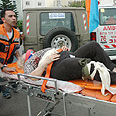
Qassm victim in Sderot
צילום: איי אף פי
Next target may be Ashkelon, defense officials warn
Intelligence information collected by defense establishment indicates that Gaza terror groups have Soviet-made Grad missiles with 22-km range; defense officials warn that terror groups may target Ashkelon in response to Israeli offensive in Gaza
Ashkelon could be the next target of Palestinian rocket attacks, defense officials warned during a security consultation at the Prime Minister's Office Wednesday. With violence worsening in the Gaza Strip, Hamas and other terror groups may decide to use Grad rockets against Israeli targets, the officials said.
Prime Minister Ehud Olmert and Defense Minister Amir Peretz instructed the defense establishment and the civil authorities to prepare for the possibility of long-range rockets attacks, which may come in response to Israel's decision Wednesday to discontinue its policy of restraint in the Gaza Strip.
The officials said that Hamas was trying to drag Israel into Gaza to force the battling Palestinian factions to unite and redirect their hostilities against Israel. After hearing the security recommendations, Olmert said there was a limit to the blows Israel could take against its sovereignty and vowed a harsh response against the continued attacks.
During the meeting IDF and Shin Bet intelligence agents said that according to information in their hands, terror groups in Gaza have Soviet-made Grad rockets, which have an approximately 22-kilometer range. Although Grads are considered relatively old-fashioned and problematic rockets, they are considerably more advanced than Qassam rockets, whose maximum range is 12 kilometers.
Military officials said they believed Palestinian terror groups planned to use the Grad rockets against Ashkelon, a city with some 110,000 residents and a number of strategic facilities. Practice drills have been carried out in the southern city, but Ashkelon has not yet been hooked up to the Color Red alert system.
Facing Europe
Foreign Minister Tzipi Livni also attended the security consultation, in accordance with the recommendations of the Winograd report on the failures of the Second Lebanon War. After the meeting, the Foreign Ministry and the PMO contacted Washington, Berlin, London, Paris and other world powers to communicate the developments in Israel, as part of a new Israeli international PR campaign.Diplomatic officials in Jerusalem said that the majority of nations, and especially moderate Arab powers, showed understanding for Israel's decision to stop exercising restraint, they said.
The officials added that Olmert still planned to meet with Palestinian President Mahmoud Abbas, although the scheduled meeting between the two has been on hold for over two months. It was first delayed due to the publication of the Winograd report, and has now been postponed again as a result of intra-Palestinian violence. "The prime minister wants the meeting to take place, but Abbas has his own problems now," they said.
'Hamas should feel threatened'
Government officials refused to reveal whether the IDF and Shin Bet might target the Hamas leadership. The official statement issued Wednesday said the army would operate against Qassam cells, their commanders, and terror operators.However, after the meeting a senior government official noted: "We've never hidden the fact that Hamas in its entirety, as a terror organization, is in Israel's sights. Anyone who terrorizes Israel's citizens should feel threatened. We won't talk anymore – we'll act to protect Israeli citizens."
Other participants in the meeting said the decisions made Wednesday did not entail a wide-scale ground offensive in the Gaza Strip.
"At this stage we don't plan to enter Gaza and wallow in the Gazan mud. We'll carry out pointed operations against terror threats and terror infrastructure - primarily Qassam cells. Yesterday we launched two Air Force strikes, and we'll launch more, with no time constraints," an official declared.
The political-security cabinet plans to assemble against Sunday to continue discussing strategic policy against Gaza terrorism. At this point the general assessment is that if there are no further escalations in attacks, Israel will suffice to launch a series of restrained retaliations. However, if Palestinian terror groups intensify attacks against Israel and fire Grad rockets on Ashkelon or cause mass destruction in southern towns, Israel may step up its response to a wide-scale ground offensive.
Hanan Greenberg contributed to the report










